LONDON (Reuters) - The British government should agree an implementation period for curbs to immigration from the European Union after Britain leaves the bloc to allow businesses time to adapt, a committee of lawmakers said in a report published on Friday.
The economics committee of the House of Lords, parliament's upper chamber, also said that without improvements to the accuracy of migration data the government would struggle to control immigration after Brexit as it would be formulating policy "in the dark".
Concerns over immigration were a key driver behind last year's vote to leave the EU and the government has made controlling Britain's borders central to its Brexit plans.
"It will take companies time to adapt their business models to be less dependent on EU workers and an implementation period is essential to ensure a smooth transition," Michael Forsyth, the committee's chairman, said in a statement.
The report said the necessary training of the British workforce and investment in new technologies could take a number of years, and businesses would need to retain access to the EU labor market during this time.
The committee also criticized existing migration data, which has a large margin of error, as "wholly inadequate".
It does not provide an accurate number of migrants entering or leaving the country, or the number of migrants in work, it said, calling on the government to work to improve the reliability of the data before basing new policy on it.
The government has repeatedly failed to meet a pledge to reduce the annual net migration level to below 100,000. In 2016 the figure fell to its lowest in more than two-and-a-half-years but, at 248,000, was still more than double that target.
The committee said sticking with a numerical target risked causing "considerable" disruption to businesses and the economy.

"The objective of reducing migration to sustainable levels should be implemented flexibly and be able to take account of labor market needs, in particular during the implementation period," it said.